| Reviews & Columns |
|
Reviews DVD TV on DVD Blu-ray 4K UHD International DVDs In Theaters Reviews by Studio Video Games Features Collector Series DVDs Easter Egg Database Interviews DVD Talk Radio Feature Articles Columns Anime Talk DVD Savant Horror DVDs The M.O.D. Squad Art House HD Talk Silent DVD
|
DVD Talk Forum |
|
|
| Resources |
|
DVD Price Search Customer Service #'s RCE Info Links |
|
Columns
|
|
|
Atonement
Universal // R // January 26, 2009
List Price: $26.98 [Buy now and save at Amazon]
The Film:
If there are any two things dreaded in the world of cinema, they might be a director's sophomore slump and the "overhyped award trap" of a film. Seeing talent seep through the cracks in their second time amidst the craft can be a very sad sight. A few years back, director Joe Wright took the historically lauded novel, Pride and Prejudice, and crafted an authentically evocative experience that both stayed true to Jane Austen's potent lyricism and left widespread cinematic eyes enchanted. His freshmen attempt at feature-length storytelling was, and remains, a tremendous success. Atonement, quite contrarily to hovering curses, is a moving masterwork that bests his premiere film, one that's dramatic, artistic, beautifully shot, emotionally touching, and, to say it simply, just an astoundingly complete piece of heartbreaking cinema.
Set in mid-1930's England, Atonement adapts Ian McEwan's novel about Briony (Saoirse Ronan), a teenage writer wedged in her family's manor amongst the enchanting rustic countryside. There, she scribes plays and jostles across the grassy expanses pining after Robbie (James McAvoy), the family housekeeper's son. His infatuation, however, is engulfed with Cecilia (Keira Knightly), his summertime pupil and Briony's visiting older sister. One day, a day in which Briony is set to assemble one of her productions with other family members, she witnesses an argument between the two that results in Cecilia storming off, dripping wet, in a fit of anger. Briony doesn't initially see their passion, only Cecilia's fury, thus weaving together the fabric of her misguided bitterness.
Atonement remains gentle and wispy throughout its graceful, tension-mounting entrance; from Briony's enamored glances to Robbie's gruff smirks, it encapsulates a comforting tone within its gorgeously confined space. Part of the film's majestic beauty comes from cinematographer Seamus McGarvey's impeccable photography, which is especially sensuous at the start. It blooms with a radiant glow, making certain to feel indulgently pure and almost heavenly from the beginning. Following Briony's numerous pathways through ivy tunnels and wood-clad hallways crafts immediacy, but a specific kind of immediacy that feels peaceful. Briony, impeccably portrayed by Saoirse Ronan, comes across as naturally tense, but with a spice for life that shines through her haunting glances.
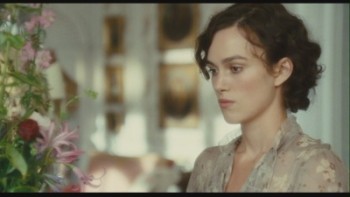 "Haunting" cleverly describes the picture in itself, especially once the stigmatic letter changes hands. Its tonal volume begins to quickly darken when the film's spiteful wrath crosses paths with purity. At his own fault, Robbie mistakenly sends Cecilia one of his private, erotically lurid brainstorms, all typed on paper, by means of a misplaced letter set to be delivered by Briony. She, instead, cracks open Pandora's Box by prying that letter open in a flash of breathless intensity. There's a moment in which she hesitates before doing so; that quiet buzz in the air as she tersely fidgets with the envelope encapsulates the dormant, stoic energy present across the first act of the film. Appalled by the contents of a letter never meant to be read, Briony becomes infuriated with her crush. Through chance circumstances involving two lost family members later that evening, she falsely accuses Robbie of venturing aside from the search and committing a defamatory, sexually condemning atrocity. There's yet another rapturous point of "silent thunder" at Briony's pivotal moment of decisiveness to step up and taint Robbie's name, which really explodes in a wealth of dramatic magnetism.
"Haunting" cleverly describes the picture in itself, especially once the stigmatic letter changes hands. Its tonal volume begins to quickly darken when the film's spiteful wrath crosses paths with purity. At his own fault, Robbie mistakenly sends Cecilia one of his private, erotically lurid brainstorms, all typed on paper, by means of a misplaced letter set to be delivered by Briony. She, instead, cracks open Pandora's Box by prying that letter open in a flash of breathless intensity. There's a moment in which she hesitates before doing so; that quiet buzz in the air as she tersely fidgets with the envelope encapsulates the dormant, stoic energy present across the first act of the film. Appalled by the contents of a letter never meant to be read, Briony becomes infuriated with her crush. Through chance circumstances involving two lost family members later that evening, she falsely accuses Robbie of venturing aside from the search and committing a defamatory, sexually condemning atrocity. There's yet another rapturous point of "silent thunder" at Briony's pivotal moment of decisiveness to step up and taint Robbie's name, which really explodes in a wealth of dramatic magnetism.
Atonement, amidst phenomenally taut momentum, cultivates performance and artistry alike into one masterfully accomplished piece of dramatic vigor. It cannot be directly contributed to the stellar cast, the robust direction from Wright, or even the visual grandeur it grasps from its cinematography. No, it's the culmination of everything Wright accomplishes into one historically effervescent entity that really grabs the viewers by their soulful hearts and thrust them forward through its powerful, albeit perplexingly hard, material. Broken hearts are the core of the picture's intensity, tapping directly into gut-wrenching emotionality to unabashed degrees, and witnessing the plummet and awakening of all the characters gyrating around this blossoming piece of work. It gradually gets worse for everyone around the crumbling central friendships, and something about the mix of striking photography and bravura performances keeps us utterly vexed from beginning to end.
Though a discomforting tone resides in Saoirse Ronan as Briony at the start, the chemistry between Keira Knightley's Cecilia and James McAvoy's Robbie stretch its sincerity well across the film's divisive four year time lapse into the surmounting complexities of wartime Europe. After all, let's remember that the definition of atonement can be summed up as "making amends" or "reconciliation". It confronts the frailty of innocence, while also hinging on the strength of belief and posterity as the effects of malevolent actions run their course. Both Cecilia and Robbie must confront life after Briony's cataclysmic lie, offering some of the more simply potent themes within Atonement. It extends to the thresholds of World War II and Robbie's strained involvement in the evacuation at Dunkirk after he's forcefully enlisted. There's an incredible tracking shot here that follows Robbie and several other soldiers through the campsite; however, while we follow his pathway through the intricately crumbled land capsized with bodies, boats, and bonfires, James McAvoy's strained and sickly glances lend a pensive air about him. His desperation for life pours through amidst this crumbled gorgeousness, though trumped by his persistent hunger for Cecilia. Never does just one aesthetic or one performance truly stand out; almost always, it's that equilibrium that gives Atonement its richness.
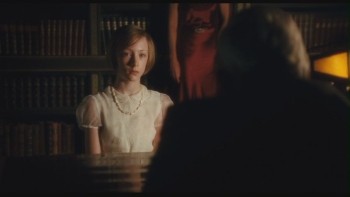 Well, almost always. Possibly the most unique aesthetic of the film, aside from these seamlessly bleeding edits from paradise to war torn dilapidation, is this amazing score from composer Dario Marianelli that manages to stand out on more than a handful of occasions. Normally, discussions about original music revolving around artists like Clint Mansell or Alexandre Desplat focus on their sumptuousness or majesty, and nothing more. Marianelli's work on Atonement achieves, on top of those qualities, a certain inventive originality; he keeps rhythm in the film along with a series of typewriter clicks synched with splendid chords that struggle to keep speed with the rapid pace. Few musical cues can both be foreshadowing, tense, and striking, yet Marianelli's Academy-award winning composition grips it all in brusque fashion.
Well, almost always. Possibly the most unique aesthetic of the film, aside from these seamlessly bleeding edits from paradise to war torn dilapidation, is this amazing score from composer Dario Marianelli that manages to stand out on more than a handful of occasions. Normally, discussions about original music revolving around artists like Clint Mansell or Alexandre Desplat focus on their sumptuousness or majesty, and nothing more. Marianelli's work on Atonement achieves, on top of those qualities, a certain inventive originality; he keeps rhythm in the film along with a series of typewriter clicks synched with splendid chords that struggle to keep speed with the rapid pace. Few musical cues can both be foreshadowing, tense, and striking, yet Marianelli's Academy-award winning composition grips it all in brusque fashion.
There are many of such nuances to be discovered and rediscovered within Wright's richly crafted layers of love's loss, vitality, and malignant destruction. Little camera tricks, musical cues, and minuscule mannerisms surface repeatedly even after indulging several times into Atonement's plummet into despondency. Marketing for this film has it all wrong; walking into this film expecting a whimsical romance that'll warm the heart is a lot like waltzing into a luxury car lot expecting to find an affordable beater. Once you've taken a look at the reality within Atonement, in its poetically melancholy and evocative strength, you're more than glad it wasn't what was to be expected. Wright's sophomore production is a beautifully sharp tour de force that, needless to say, shouldn't be missed.
The Blu-ray:
This Blu-ray presentation of Atonement arrives from Universal in a standard style blue keepcase with a gaudy, gold slipcover coating the outside that's not terribly appealing. The actual artwork, once the cardboard covering has been removed, is appropriate and very attractive, looking exactly like the standard-definition presentation -- only without the blue border. Keep in mind that this release is NOT a dual-sided disc and only contains the film on Blu-ray, supposedly (and unfortunately) one of the last catalog Blu-ray releases like this from Universal. Here's hoping they'll reconsider.
Video and Audio:
For quite a while, Atonement held a spot on my short list of favorite high-definition presentations with Universal's release on the now-defunct HD-DVD format -- which is essentially the same encode for both the US and UK releases. Since then, many dramas have been offered in robust and beautiful images on Blu-ray, taking this image down a few pegs. Essentially, Universal have offered Atonement on this Blu-ray in an 1080p AVC image that replicates the quality of its dominant HD-DVD counterpart, topping out with higher technical specs (bitrate that tops out in the mid-30s) but not differentiating to any drastic levels. Bear in mind that it's not a slight, as the image is beautiful, but more of an acknowledgment. It does still remain a favorite due to fondness for the picture itself, but this image has certainly been "bested" by the likes of many other catalogue releases.
Unlike Universal's standard-definition presentation, Seamus McGarvey's cinematography has been slightly opened up from 1.85:1 to 1.78:1 to fill the entire screen. Separated into distinct portions of the story, the image quality fluctuates with the locations in which the scenes are set. Near the grassy, idyllic shots when we're following Briony on her tirade, the image has man instances of blooming, bright lighting and softened detail -- textured and well-etched, still, but generally soft to degrees. A pleasing level of film grain becomes visible at many points, never growing heavier than the natural source or distorting the look of the picture. As the film's photography darkens, contrast levels match the cinematography in tossing out extremely rich blacks (at times, a little too dark) and pleasing shadows against lighting. Later on, the image dips into depressing blue-hued color timing, and the encode keeps speed with these shots. However, from start to finish, the likes of skin hues and texture in close-ups, wartime destruction, and all other forms of sleek yet detailed set design offer a picture that's as good, if not better, than the theatrical appearance.
Receiving a boost from its HD-DVD counterpart, much like several other Universal re-releases like Children of Men and The Bourne Identity, Atonement comes with a DTS HD Master Audio track that adds a pinch of extra clarity to the film's rapturous score and wispy dialogue. At the very beginning of the film, we're trumpeted into the story with a thumping typewriter as a percussion instrument, and every single hammer hit tackles both high and low-range elements. The bass channel gets more of a workout than you might expect in this picture, from a few explosions during the wartime sequences to the graceful thumps of feet against flooring, as do the surround channels with clear musical and ambient elements. But, again, the major star of the show is Dario Marianelli' entrancing Oscar-winning score, which drives the picture with powerfully rhythmic precision. Dialogue stays true and clear, if a bit muffled in a few sequences, rounding out a spaciously aware and delightful audio track. French and Spanish DTS tracks are also available as sound options, along with optional subtitles in all three of the aformentioned languages.
Special Features:
Universal has pieced together a handful of sharp extras for Atonement that cover most of the core necessities (carried over from the standard-definition release). Though it's not massive in quantity, these supplements get a lot accomplished in their paltry numbers.
Commentary with director Joe Wright:
Joe Wright often indulges his commentary's audience with insightful points on retrospective and literate themes in his track. He does have a few expanses of silence where you might get a little ancy to hear what he has to say. Especially when he discusses Briony, you get a lot of interesting nuances and eccentricities from this commentary. It's an interesting, introspective listen that couples with the film quite well.
Bringing the Past to Life: The Making of Atonement (26:53, SD MPEG-2):
This anamorphic 26 to 27-minute documentary is another one of those shorter assembly pieces that gives ample doses of every element involved in making the film. Everyone, from Joe Wright and his cast to the production designers, are featured in candid and insightful interviews that dissect and elaborate on many intricate parts of Atonement. They discuss contingencies and inspirations, such as McGarvey's analysis on Briony's creative energy and how it was to be filmed. It's a really nice, expansive, and rather compact doc for the volume of material addressed.
From Novel To Screen: Adapting a Classic (5:04, SD MPEG-2):
Though he surfaces sporadically in the other featurette, Ian McEwan is brought into the spotlight here with this 5-minute piece. Joe Wright et al discuss the stages of adapting the novel to screen, including the problematic first draft void of the book's complete essence.
Deleted Scenes (7:33, SD MPEG-2):
Joe Wright, in his optional commentary with the deleted scenes, makes a great comment that essentially sums up to the scenes being removed because he felt they were poorly directed. In fact, most of them just seem to be removed for pacing issues, as they would've slowed down the furious pace made so strong in the film. It's around 7 and a half minutes deleted scenes that both weaken and convolute characters at times, while also seeming to noticeably slow the pace down.
Final Thoughts:
Atonement received recognition from the Academy Awards, The Golden Globes, and, more appropriately, from BAFTA as one of the pinnacle pieces of cinema from 2007. It deserves such rich praise, as it is an immensely impacting and powerful portrait of love, war, and the innocent infatuation of a young girl. Each and every performance and cinematic element achieves insurmountable resonance in Joe Wright's second and more apt foray in the period piece adaptation genre. Packed with extremely competent visual and aural qualities, as well as a decent tray of extra material, this is a very adept presentation for a genuinely striking film. Universal have practically offered the same visual, aural and supplemental treatment for the film on Blu-ray as they did for their HD-DVD, only with a extra boost with the Master Audio language track and the heightened bitrate for the AVC encode. Needless to say, both the disc and the exceptional film come Highly Recommended.
Note: Images from this review are from Universal's standard-definition DVD, and do not reflect the quality of the Blu-ray discussed here.
Thomas Spurlin, Staff Reviewer -- DVDTalk Reviews | Personal Blog/Site
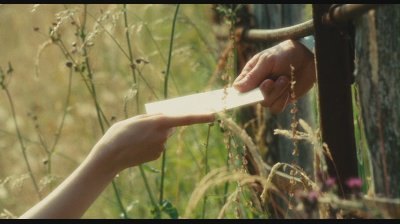 |
Set in mid-1930's England, Atonement adapts Ian McEwan's novel about Briony (Saoirse Ronan), a teenage writer wedged in her family's manor amongst the enchanting rustic countryside. There, she scribes plays and jostles across the grassy expanses pining after Robbie (James McAvoy), the family housekeeper's son. His infatuation, however, is engulfed with Cecilia (Keira Knightly), his summertime pupil and Briony's visiting older sister. One day, a day in which Briony is set to assemble one of her productions with other family members, she witnesses an argument between the two that results in Cecilia storming off, dripping wet, in a fit of anger. Briony doesn't initially see their passion, only Cecilia's fury, thus weaving together the fabric of her misguided bitterness.
Atonement remains gentle and wispy throughout its graceful, tension-mounting entrance; from Briony's enamored glances to Robbie's gruff smirks, it encapsulates a comforting tone within its gorgeously confined space. Part of the film's majestic beauty comes from cinematographer Seamus McGarvey's impeccable photography, which is especially sensuous at the start. It blooms with a radiant glow, making certain to feel indulgently pure and almost heavenly from the beginning. Following Briony's numerous pathways through ivy tunnels and wood-clad hallways crafts immediacy, but a specific kind of immediacy that feels peaceful. Briony, impeccably portrayed by Saoirse Ronan, comes across as naturally tense, but with a spice for life that shines through her haunting glances.
 "Haunting" cleverly describes the picture in itself, especially once the stigmatic letter changes hands. Its tonal volume begins to quickly darken when the film's spiteful wrath crosses paths with purity. At his own fault, Robbie mistakenly sends Cecilia one of his private, erotically lurid brainstorms, all typed on paper, by means of a misplaced letter set to be delivered by Briony. She, instead, cracks open Pandora's Box by prying that letter open in a flash of breathless intensity. There's a moment in which she hesitates before doing so; that quiet buzz in the air as she tersely fidgets with the envelope encapsulates the dormant, stoic energy present across the first act of the film. Appalled by the contents of a letter never meant to be read, Briony becomes infuriated with her crush. Through chance circumstances involving two lost family members later that evening, she falsely accuses Robbie of venturing aside from the search and committing a defamatory, sexually condemning atrocity. There's yet another rapturous point of "silent thunder" at Briony's pivotal moment of decisiveness to step up and taint Robbie's name, which really explodes in a wealth of dramatic magnetism.
"Haunting" cleverly describes the picture in itself, especially once the stigmatic letter changes hands. Its tonal volume begins to quickly darken when the film's spiteful wrath crosses paths with purity. At his own fault, Robbie mistakenly sends Cecilia one of his private, erotically lurid brainstorms, all typed on paper, by means of a misplaced letter set to be delivered by Briony. She, instead, cracks open Pandora's Box by prying that letter open in a flash of breathless intensity. There's a moment in which she hesitates before doing so; that quiet buzz in the air as she tersely fidgets with the envelope encapsulates the dormant, stoic energy present across the first act of the film. Appalled by the contents of a letter never meant to be read, Briony becomes infuriated with her crush. Through chance circumstances involving two lost family members later that evening, she falsely accuses Robbie of venturing aside from the search and committing a defamatory, sexually condemning atrocity. There's yet another rapturous point of "silent thunder" at Briony's pivotal moment of decisiveness to step up and taint Robbie's name, which really explodes in a wealth of dramatic magnetism. Atonement, amidst phenomenally taut momentum, cultivates performance and artistry alike into one masterfully accomplished piece of dramatic vigor. It cannot be directly contributed to the stellar cast, the robust direction from Wright, or even the visual grandeur it grasps from its cinematography. No, it's the culmination of everything Wright accomplishes into one historically effervescent entity that really grabs the viewers by their soulful hearts and thrust them forward through its powerful, albeit perplexingly hard, material. Broken hearts are the core of the picture's intensity, tapping directly into gut-wrenching emotionality to unabashed degrees, and witnessing the plummet and awakening of all the characters gyrating around this blossoming piece of work. It gradually gets worse for everyone around the crumbling central friendships, and something about the mix of striking photography and bravura performances keeps us utterly vexed from beginning to end.
Though a discomforting tone resides in Saoirse Ronan as Briony at the start, the chemistry between Keira Knightley's Cecilia and James McAvoy's Robbie stretch its sincerity well across the film's divisive four year time lapse into the surmounting complexities of wartime Europe. After all, let's remember that the definition of atonement can be summed up as "making amends" or "reconciliation". It confronts the frailty of innocence, while also hinging on the strength of belief and posterity as the effects of malevolent actions run their course. Both Cecilia and Robbie must confront life after Briony's cataclysmic lie, offering some of the more simply potent themes within Atonement. It extends to the thresholds of World War II and Robbie's strained involvement in the evacuation at Dunkirk after he's forcefully enlisted. There's an incredible tracking shot here that follows Robbie and several other soldiers through the campsite; however, while we follow his pathway through the intricately crumbled land capsized with bodies, boats, and bonfires, James McAvoy's strained and sickly glances lend a pensive air about him. His desperation for life pours through amidst this crumbled gorgeousness, though trumped by his persistent hunger for Cecilia. Never does just one aesthetic or one performance truly stand out; almost always, it's that equilibrium that gives Atonement its richness.
 Well, almost always. Possibly the most unique aesthetic of the film, aside from these seamlessly bleeding edits from paradise to war torn dilapidation, is this amazing score from composer Dario Marianelli that manages to stand out on more than a handful of occasions. Normally, discussions about original music revolving around artists like Clint Mansell or Alexandre Desplat focus on their sumptuousness or majesty, and nothing more. Marianelli's work on Atonement achieves, on top of those qualities, a certain inventive originality; he keeps rhythm in the film along with a series of typewriter clicks synched with splendid chords that struggle to keep speed with the rapid pace. Few musical cues can both be foreshadowing, tense, and striking, yet Marianelli's Academy-award winning composition grips it all in brusque fashion.
Well, almost always. Possibly the most unique aesthetic of the film, aside from these seamlessly bleeding edits from paradise to war torn dilapidation, is this amazing score from composer Dario Marianelli that manages to stand out on more than a handful of occasions. Normally, discussions about original music revolving around artists like Clint Mansell or Alexandre Desplat focus on their sumptuousness or majesty, and nothing more. Marianelli's work on Atonement achieves, on top of those qualities, a certain inventive originality; he keeps rhythm in the film along with a series of typewriter clicks synched with splendid chords that struggle to keep speed with the rapid pace. Few musical cues can both be foreshadowing, tense, and striking, yet Marianelli's Academy-award winning composition grips it all in brusque fashion. There are many of such nuances to be discovered and rediscovered within Wright's richly crafted layers of love's loss, vitality, and malignant destruction. Little camera tricks, musical cues, and minuscule mannerisms surface repeatedly even after indulging several times into Atonement's plummet into despondency. Marketing for this film has it all wrong; walking into this film expecting a whimsical romance that'll warm the heart is a lot like waltzing into a luxury car lot expecting to find an affordable beater. Once you've taken a look at the reality within Atonement, in its poetically melancholy and evocative strength, you're more than glad it wasn't what was to be expected. Wright's sophomore production is a beautifully sharp tour de force that, needless to say, shouldn't be missed.
The Blu-ray:
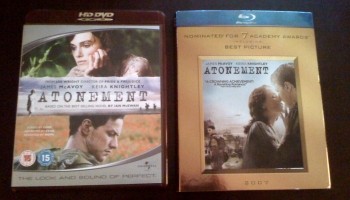 | 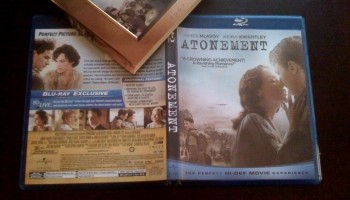 |
This Blu-ray presentation of Atonement arrives from Universal in a standard style blue keepcase with a gaudy, gold slipcover coating the outside that's not terribly appealing. The actual artwork, once the cardboard covering has been removed, is appropriate and very attractive, looking exactly like the standard-definition presentation -- only without the blue border. Keep in mind that this release is NOT a dual-sided disc and only contains the film on Blu-ray, supposedly (and unfortunately) one of the last catalog Blu-ray releases like this from Universal. Here's hoping they'll reconsider.
Video and Audio:
For quite a while, Atonement held a spot on my short list of favorite high-definition presentations with Universal's release on the now-defunct HD-DVD format -- which is essentially the same encode for both the US and UK releases. Since then, many dramas have been offered in robust and beautiful images on Blu-ray, taking this image down a few pegs. Essentially, Universal have offered Atonement on this Blu-ray in an 1080p AVC image that replicates the quality of its dominant HD-DVD counterpart, topping out with higher technical specs (bitrate that tops out in the mid-30s) but not differentiating to any drastic levels. Bear in mind that it's not a slight, as the image is beautiful, but more of an acknowledgment. It does still remain a favorite due to fondness for the picture itself, but this image has certainly been "bested" by the likes of many other catalogue releases.
Unlike Universal's standard-definition presentation, Seamus McGarvey's cinematography has been slightly opened up from 1.85:1 to 1.78:1 to fill the entire screen. Separated into distinct portions of the story, the image quality fluctuates with the locations in which the scenes are set. Near the grassy, idyllic shots when we're following Briony on her tirade, the image has man instances of blooming, bright lighting and softened detail -- textured and well-etched, still, but generally soft to degrees. A pleasing level of film grain becomes visible at many points, never growing heavier than the natural source or distorting the look of the picture. As the film's photography darkens, contrast levels match the cinematography in tossing out extremely rich blacks (at times, a little too dark) and pleasing shadows against lighting. Later on, the image dips into depressing blue-hued color timing, and the encode keeps speed with these shots. However, from start to finish, the likes of skin hues and texture in close-ups, wartime destruction, and all other forms of sleek yet detailed set design offer a picture that's as good, if not better, than the theatrical appearance.
Receiving a boost from its HD-DVD counterpart, much like several other Universal re-releases like Children of Men and The Bourne Identity, Atonement comes with a DTS HD Master Audio track that adds a pinch of extra clarity to the film's rapturous score and wispy dialogue. At the very beginning of the film, we're trumpeted into the story with a thumping typewriter as a percussion instrument, and every single hammer hit tackles both high and low-range elements. The bass channel gets more of a workout than you might expect in this picture, from a few explosions during the wartime sequences to the graceful thumps of feet against flooring, as do the surround channels with clear musical and ambient elements. But, again, the major star of the show is Dario Marianelli' entrancing Oscar-winning score, which drives the picture with powerfully rhythmic precision. Dialogue stays true and clear, if a bit muffled in a few sequences, rounding out a spaciously aware and delightful audio track. French and Spanish DTS tracks are also available as sound options, along with optional subtitles in all three of the aformentioned languages.
Special Features:
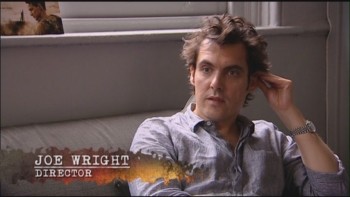 | 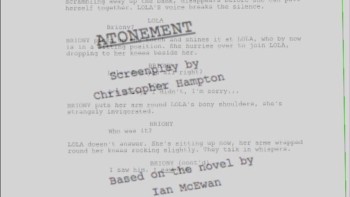 |
Universal has pieced together a handful of sharp extras for Atonement that cover most of the core necessities (carried over from the standard-definition release). Though it's not massive in quantity, these supplements get a lot accomplished in their paltry numbers.
Commentary with director Joe Wright:
Joe Wright often indulges his commentary's audience with insightful points on retrospective and literate themes in his track. He does have a few expanses of silence where you might get a little ancy to hear what he has to say. Especially when he discusses Briony, you get a lot of interesting nuances and eccentricities from this commentary. It's an interesting, introspective listen that couples with the film quite well.
Bringing the Past to Life: The Making of Atonement (26:53, SD MPEG-2):
This anamorphic 26 to 27-minute documentary is another one of those shorter assembly pieces that gives ample doses of every element involved in making the film. Everyone, from Joe Wright and his cast to the production designers, are featured in candid and insightful interviews that dissect and elaborate on many intricate parts of Atonement. They discuss contingencies and inspirations, such as McGarvey's analysis on Briony's creative energy and how it was to be filmed. It's a really nice, expansive, and rather compact doc for the volume of material addressed.
From Novel To Screen: Adapting a Classic (5:04, SD MPEG-2):
Though he surfaces sporadically in the other featurette, Ian McEwan is brought into the spotlight here with this 5-minute piece. Joe Wright et al discuss the stages of adapting the novel to screen, including the problematic first draft void of the book's complete essence.
Deleted Scenes (7:33, SD MPEG-2):
Joe Wright, in his optional commentary with the deleted scenes, makes a great comment that essentially sums up to the scenes being removed because he felt they were poorly directed. In fact, most of them just seem to be removed for pacing issues, as they would've slowed down the furious pace made so strong in the film. It's around 7 and a half minutes deleted scenes that both weaken and convolute characters at times, while also seeming to noticeably slow the pace down.
Final Thoughts:
Atonement received recognition from the Academy Awards, The Golden Globes, and, more appropriately, from BAFTA as one of the pinnacle pieces of cinema from 2007. It deserves such rich praise, as it is an immensely impacting and powerful portrait of love, war, and the innocent infatuation of a young girl. Each and every performance and cinematic element achieves insurmountable resonance in Joe Wright's second and more apt foray in the period piece adaptation genre. Packed with extremely competent visual and aural qualities, as well as a decent tray of extra material, this is a very adept presentation for a genuinely striking film. Universal have practically offered the same visual, aural and supplemental treatment for the film on Blu-ray as they did for their HD-DVD, only with a extra boost with the Master Audio language track and the heightened bitrate for the AVC encode. Needless to say, both the disc and the exceptional film come Highly Recommended.
|
| Popular Reviews |
| Sponsored Links |
|
|
| Sponsored Links |
|
|
| Release List | Reviews | Shop | Newsletter | Forum | DVD Giveaways | Blu-Ray | Advertise |
|
Copyright 2024 DVDTalk.com All Rights Reserved. Legal Info, Privacy Policy, Terms of Use,
Manage Preferences,
Your Privacy Choices | |||||||














